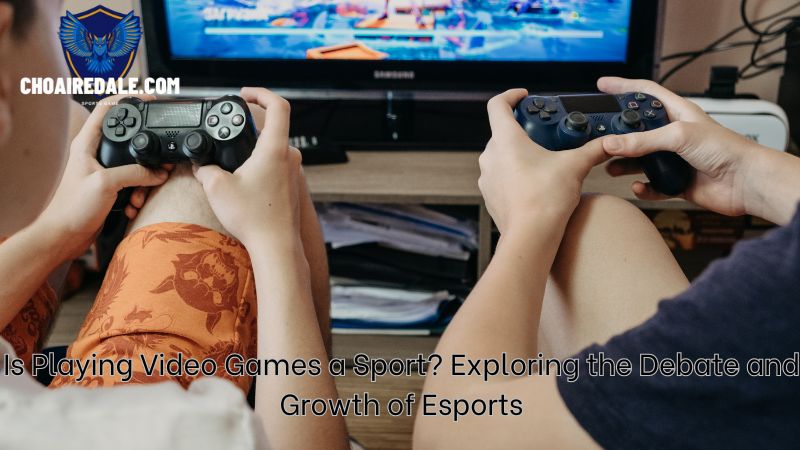In the past few decades, video games have evolved from a niche hobby to a global phenomenon. As technology has advanced, so too has the skill and strategy required to play video games. Today, competitive gaming, or esports, is not just a pastime but a multi-billion-dollar industry, attracting millions of viewers and offering significant career opportunities for professional gamers. But this rise in popularity has sparked an ongoing debate: Is playing video games a sport?
In this article, Cho Airedele will explore the argument from both sides, delve into the world of esports, and analyze whether playing video games can truly be classified as a sport. Let’s break it down and look at the key points that are fueling this discussion.
What Defines a Sport?
Before diving into whether video gaming qualifies as a sport, it’s essential to define what a sport is. Traditionally, sports are physical activities that involve a high degree of skill and physical exertion. They usually have specific rules and are competitive in nature. The International Olympic Committee (IOC) and many sports organizations have long adhered to this definition, but the landscape of sports is evolving.
In addition to physical exertion, sports typically include:
- Skill and strategy: Whether it’s soccer, basketball, or chess, sports require mental acuity, strategic thinking, and the ability to make quick decisions under pressure.
- Competition: Most sports involve direct competition against others, whether it’s a team versus a team or an individual against another individual.
- Rules: Every sport operates under a defined set of rules and guidelines that dictate how it is played and judged.
- Recognition: A recognized sport often has formalized leagues, tournaments, and governing bodies that regulate the rules and oversee competitions.
Given these characteristics, let’s consider whether video games, especially esports, fit this framework.
The Rise of Esports: A New Form of Competition

Is Playing Video Games a Sport? Exploring the Debate and Growth of Esports
The growth of esports over the past two decades has been nothing short of remarkable. Esports refers to competitive video gaming, where players or teams compete against each other in various video games in organized tournaments. These games range from real-time strategy (RTS) games like Starcraft II to first-person shooters (FPS) like Counter-Strike or Call of Duty, and multiplayer online battle arena (MOBA) games like League of Legends.
Esports has rapidly gained global popularity, with professional players and teams earning sponsorships, lucrative salaries, and even national recognition. Esports tournaments, such as the League of Legends World Championship or The International (Dota 2), draw millions of viewers, both online and in-person. These events are broadcast on major streaming platforms like Twitch and YouTube, while top-tier tournaments are even shown on television networks.
The growth of esports has also brought about the rise of esports organizations, which support professional teams, provide training, and manage player careers. Esports has become a highly structured industry, with detailed rules, formal coaching, and player statistics. In this sense, esports shares many characteristics with traditional sports leagues such as the NBA or NFL.
Physical vs. Mental Skills in Esports
One of the primary arguments against classifying video gaming as a sport is that it doesn’t involve the same physical exertion as traditional sports like football, basketball, or tennis. In physical sports, athletes must be in peak physical condition to excel, as they rely on their bodies to perform complex movements, exert force, and maintain stamina. On the other hand, video games primarily require mental agility, hand-eye coordination, and strategic thinking.
While it’s true that esports players don’t undergo the same kind of physical training as traditional athletes, they still face physical demands. Esports players must have excellent reflexes, hand-eye coordination, and focus, and many professional players train for hours every day to improve these skills. Just like traditional athletes, they also need to be in top mental shape. The physical toll of sitting for long hours, staring at screens, and performing rapid hand movements can lead to injuries like carpal tunnel syndrome, eye strain, and other repetitive strain injuries (RSI), requiring players to maintain their physical health as well.
Moreover, the cognitive load involved in gaming is immense. Esports players often have to make split-second decisions, anticipate opponents’ moves, and adapt strategies on the fly. This requires significant mental endurance, similar to the focus and quick thinking required in high-stakes traditional sports.
The Competitive Nature of Esports
Another critical aspect of sports is competition. Traditional sports have long been recognized for their competitive nature, where athletes strive to outdo each other in a physical or skill-based challenge. The competitive aspect of esports cannot be denied, with players and teams constantly battling for world championships, cash prizes, and recognition.
Esports competitions are just as intense as traditional sports. Players practice for months, if not years, to develop their skills, and esports tournaments feature some of the most skilled competitors in the world. The world of esports is filled with incredible moments of high-level strategy, precise execution, and dramatic comebacks—much like a game-winning shot in basketball or a last-minute touchdown in football.
Esports also shares other competitive features with traditional sports, such as the presence of coaches, team dynamics, and commentators. Just like traditional sports, esports tournaments are broadcast live, with professional commentators providing analysis and play-by-play commentary.
Esports in the Media and Public Perception
Despite its growth, esports is still not universally accepted as a legitimate sport in some circles. Many people continue to view video games as a form of entertainment or a hobby rather than as a sport. This perception may stem from the traditional definition of sports, which has been heavily focused on physical activity.
However, over the years, the increasing recognition of esports in mainstream media, along with the rise of esports scholarships, academic programs, and professional leagues, has helped validate it as a legitimate sport. Major universities in North America, Europe, and Asia are now offering esports programs, and professional esports leagues are attracting sponsorships from top-tier brands, further reinforcing the notion of esports as a serious competitive endeavor.
Even traditional sports organizations are beginning to recognize esports. For example, in 2020, the International Olympic Committee (IOC) held discussions about the potential inclusion of esports in the Olympic Games. While video games may not yet be in the Olympics, this recognition by one of the most prestigious sporting organizations in the world suggests that esports are increasingly seen as legitimate competitors in the sporting world.
Video Games and Traditional Sports: Complementary, Not Competing
While the debate over whether playing video games is a sport continues, it’s important to recognize that video games and traditional sports can be complementary. Many professional athletes, including those in the NFL, NBA, and eSports, are avid gamers. Video games can serve as a means of entertainment, relaxation, and stress relief, allowing athletes to unwind and practice their mental skills.
Moreover, the increasing convergence between video games and traditional sports has led to the creation of games that simulate real-world sports, such as the FIFA series, NBA 2K, and Madden NFL. These games offer fans a chance to engage with their favorite sports in a digital format, creating a bridge between the virtual and physical worlds of sport.
Conclusion: Is Playing Video Games a Sport?
So, is playing video games a sport? The answer isn’t entirely straightforward, but it can be argued that esports is indeed a form of competition that shares many characteristics with traditional sports. While it doesn’t involve physical exertion in the same way as basketball or soccer, it requires skill, strategy, mental focus, and intense competition—all hallmarks of sports.
As the esports industry continues to grow and evolve, it’s likely that the debate over whether video games are a sport will continue. What is clear, however, is that esports has already established itself as a legitimate form of competition with its own passionate fanbase, professional players, and tournaments. Whether or not it is officially recognized as a sport in the traditional sense, esports has carved out a place for itself in the global sporting landscape.
In the future, it’s possible that we will see further integration between esports and traditional sports, with more crossovers, collaboration, and recognition of competitive gaming as a sport in its own right.












